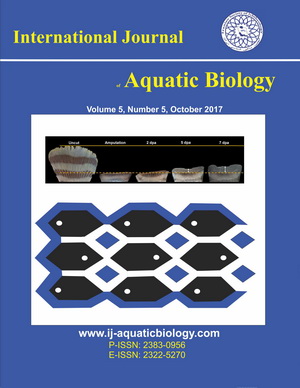Effects of dietary supplementation of zinc oxide nanoparticles on some biochemical biomarkers in common carp (Cyprinus carpio)
Downloads
Downloads
Badkoobeh P., Parivar K., Kalantar S.M., Hosseini S.D., Salabat A. (2013). Effect of nano-zinc oxide on doxorubicin- induced oxidative stress and sperm disorders in adult male Wistar rats. Iranian Journal of Reproductive Medicine, 11(5): 355-364.
Bahrami B., Hojjat-Farsangi M., Mohammadi H., Anvari E., Ghalamfarsa G., Yousefi M., Jadidi-Niaragh F. (2017). Nanoparticles and targeted drug delivery in cancer therapy. Immunology Letters, 190: 64-83.
Banaee M., Shahafve S., Tahery S., Nemadoost Haghi B., Vaziriyan M. (2016). Sublethal toxicity of TiO2 nanoparticles to common carp (Cyprinus carpio, Linnaeus, 1758) under visible light and dark conditions. International Journal of Aquatic Biology, 4(6): 370-377.
Benzie I., Strain J. (1996). The ferric reducing ability of plasma (FRAP) as a measure of "antioxidant power. the FRAP assay', Analytical Biochemistry, 239(1): 70-76.
Chen L., Groenewoud A., Tulotta C., Zoni E., Julio M.K., van der Horst G., van der Pluijm G., Snaae-Jagalska E. (2017). A zebrafish xenograft model for studying human cancer stem cells in distant metastasis and therapy response. Methods in Cell Biology, 138: 471-496.
Chen L., Yang J., Zheng M., Kong X., Huang T., Cai Y.-D. (2015). The use of chemical-chemical interaction and chemical structure to identify new candidate chemicals related to lung cancer. PLoS ONE, 10(6), e0128696.
Cong Y., Jin F., Wang J., Mu J. (2017). The embryotoxicity of ZnO nanoparticles to marine medaka, Oryzias melastigma. Aquatic Toxicology, 185: 11-18.
Connolly M., Fernández M., Conde E., Torrent F., Navas J.M., Fernández-Cruz M.L. (2016). Tissue distribution of zinc and subtle oxidative stress effects after dietary administration of ZnO nanoparticles to rainbow trout. Science of The Total Environment, 551: 334-343.
Davis D.A., Gatlin D.M. (1996). Dietary mineral requirements of fish and marine crustaceans. Reviews in Fisheries Science, 4(1): 77-99.
Dawei A.I., Zhisheng W., Anguo Z. (2010). Protective effects of nano-ZnO on the primary culture mice intestinal epithelial cells in in vitro against oxidative injury. World Journal of Agricultural Sciences, 6: 149-153.
Dieni C.A., Callaghan N.I., Gormley P.T., Butler K.M.A., MacCormack T.J. (2014). Physiological hepatic response to zinc oxide nanoparticle exposure in the white sucker, Catostomus commersonii. Comparative Biochemistry and Physiology, Part C, 162: 51-61.
Farah H.S., Al-Atoom A.A., Shehab G.M. (2012). Explanation of the decrease in alkaline phosphatase (ALP) activity in hemolysed blood samples from the clinical point of view: In vitro study. Jordan Journal of Biological Sciences, 5(2): 125-128.
Fathi M. (2016). Effects of zinc oxide nanoparticles supplementation on mortality due to ascites and performance growth in broiler chichens. IJAS, 6(2): 389-394.
Fazilati M. (2013). Investigation toxicity properties of zinc oxide nanoparticles on liver enzymes in male rat. European Journal of Experimental Biology, 3(1): 97-103.
Fernández D., García-Gómez C., Babín M. (2013). In vitro evaluation of cellular responses induced by ZnO nanoparticles, zinc ions and bulk ZnO in fish cells. Science of The Total Environment, 452: 262-274.
Fröhlich E.E., Fröhlich E. (2016). Cytotoxicity of nanoparticles contained in food on intestinal cells and the gut microbiota. International Journal of Molecular Sciences, 17(4): 509.
Gómez-Milán E., Lozano M.J.S.M. (2007). Daily and annual variations of the hepatic glucose 6-phosphate dehydrogenase activity and seasonal changes in the body fats of the gilthead seabream Sparus aurata. Journal of Experimental Zoology Part A: Ecological Genetics and Physiology, 307A: 516-526.
Góth L.A. (1991). Simple method for determination of serum catalase and revision of reference range. Clinica Chimica Acta, 196: 143-152.
Gupta R.K., Gangoliya S.S., Singh N.K. (2015). Reduction of phytic acid and enhancement of bioavailable micronutrients in food grains. Journal of Food Science and Technology, 52(2): 676-684.
Hao L., Chen L. (2012). Oxidative stress responses in different organs of carp (Cyprinus carpio) with exposure to ZnO nanoparticles. Ecotoxicology and Environmental Safety, 80: 103-110.
Hao L., Chen L., Hao J., Zhong N. (2013). Bioaccumulation and sub-acute toxicity of zinc oxide nanoparticles in juvenile carp (Cyprinus carpio): A comparative study with its bulk counterpart. Ecotoxicology and Environmental Safety, 91: 52-60.
Hossain M.A., Matsui S., Furuichi M. (2003). Effect pf zinc and manganese supplementation to tricalcium phosphate rich diet for tiger puffer (Takifugu rubripes). Bangladesh Journal of Fisheries Research, 7(2): 189-192.
Johnson A.M., Rohlfs E.M., Silverman L.M. (1999). Proteins. In: C.A. Burtis, E.R. Ashwood (Eds.). Tietz Textbook of Clinical Chemistry. 3rd ed., Philadelphia: W.B. Saunders Company. 1917 p.
Kao Y.Y., C, C.Y., Cheng, T.J., Chiung, Y.M., Liu, P.S. (2012). Zinc oxide nanoparticles interfere with zinc ion homeostasis to cause cytotoxicity. Toxicological Sciences, 125: 462-472.
Kool P.L., Ortiz M.D., van Gestel C.A. (2011). Chronic toxicity of ZnO nanoparticles, non-nano ZnO and ZnCl2 to Folsomia candida (Collembola) in relation to bioavailability in soil. Environmental Pollution, 159, 2713-2719.
Kumar A., Pandey A.K., Singh S.S., Shanker R., Dhawan A. (2011). Engineered ZnO and TiO2 nanoparticles induce oxidative stress and DNA damage leading to reduced viability of Escherichia coli. Free Radical Biology and Medicine, 51: 1872-1881.
Lee J.W., Kim J.E., Shin Y.J., Ryu J.S., Eom I.C., Lee J.S., Kim Y., Kim P.J., Choi K.H., Lee B.C. (2014). Serum and ultrastructure responses of common carp (Cyprinus carpio L.) during long-term exposure to zinc oxide nanoparticles. Ecotoxicology and Environmental Safety, 104: 9-17.
Mehrpak M., Banaee M., Nematdoost Haghi B., Noori A. (2015). Protective effects of vitamin C and chitosan against cadmium-induced oxidative stress in the liver of common carp (Cyprinus carpio). Iranian Journal of Toxicology, 9(30): 1360-1367.
Moss D.V., Henderson A.R. (1999). Clinical enzymology. In: C.A. Burtis, E.R. Ashwood (Eds.). Tietz Textbook of Clinical Chemistry. 3rd ed., Philadelphia: W.B. Saunders Company. 1917 p.
Muralisankar T., Bhavan P.S., Radhakrishnan S., Seenivasan C., Manickam N., Srinivasan V. (2014) 'Dietary supplementation of zinc nanoparticles and its influence on biology, physiology and immune responses of the freshwater prawn, Macrobrachium rosenbergii. Biological Trace Element Research, 160(1): 56-66.
Murray R.K., Granner D.K., Mayes P.A., Rodwell V.W. (2003). Harper's Illustrated Biochemistry, 26th Edition, McGraw-Hill, Medical Publishing Division. 818 p.
Muthuraman P., Kim D.H. (2015). ZnO nanoparticles augment ALT, AST, ALP and LDH expressions in C2C12 cells. Saudi Journal of Biological Sciences, 22(6): 679-684.
Muthuraman P., Ramkumar K., Kim D.H. (2014). Analysis of dose-dependent effect of zinc oxide nanoparticles on the oxidative stress and antioxidant enzyme activity in adipocytes. Applied Biochemistry and Biotechnology, 174(8): 2851-2863.
Nagajyothia P.C., Chab S.J., Yanga I.J., Sreekanthc T.V.M., Kimb K.J., Shin H.M. (2015). Antioxidant and anti-inflammatory activities of zinc oxide nanoparticles synthesized using Polygala tenuifolia root extract. Journal of Photochemistry and Photobiology B: Biology, 146: 10-17.
Nagajyothia P.C., Sreekanthb T.V.M., Tetteya C.O., Juna Y.I., Mook S.H. (2014) 'Characterization, antibacterial, antioxidant, and cytotoxic activities of ZnO nanoparticles using Coptidis Rhizoma. Bioorganic and Medicinal Chemistry Letters, 24(17): 4298-4303.
Najafzadeh H., Ghoreishi S.M., Mohammadian B., Rahimi E., Afzalzadeh M.R., Kazemivarnamkhasti M., Ganjealidarani H. (2013). Serum biochemical and histopathological changes in liver and kidney in lambs after zinc oxide nanoparticles administration. Veterinary World, 6: 534-537.
Pandurangan M., Kim D.H.J. (2015a). In vitro toxicity of zinc oxide nanoparticles: a review', Nanopart Res, 17: 158.
Pandurangan M., Kim D.H. (2015b). ZnO nanoparticles augment ALT, AST, ALP and LDH expressions in C2C12 cells. Saudi Journal of Biological Sciences, 22(6): 679-684.
Placer Z., Cushman L., Johnson B. (1996). Estimation of product of lipid peroxidation (malonyl dialdehyde) in biochemical systems. Analytical Biochemistry, 16(2): 359-364.
Prasad A.S. (2014). Zinc is an antioxidant and anti-inflammatory agent: Its role in human health. Frontiers in Nutrition, 1: 14.
Sauer B.G. (1998). Effects of zinc on Glucose-6-Phosphate Dehydrogenase in buffalo rat liver cells, Biological Sciences Department, Western Michigan University, Honors Theses. 250 p.
Stanton R.C. (2012). Glucose-6-Phosphate dehydro-genase, NADPH, and CELL SURVIVAL. IUBMB Life, 64(5): 362-369.
Swain P.S., Rajendran D., Rao S.B.N., Dominic G. (2015). Preparation and effects of nano mineral particle feeding in livestock: A review. Veterinary World, 8(7): 888-891.
Swain P.S., Rao S.B.N., Rajendran D., Dominic G., Selvaraju S. (2016). Nano zinc, an alternative to conventional zinc as animal feed supplement: A review. Animal Nutrition, 2(3): 134-141.
Syama S., Reshma S.C., Sreekanth P.J., Varma H.K., Mohanan P.V. (2013). Effect of zinc oxide nanoparticles on cellular oxidative stress and antioxidant defense mechanisms in mouse liver. Toxicological and Environmental Chemistry, 95: 495-503.
Umrani D.R., Paknikar K.M. (2014). Zinc oxide nanoparticles show antidiabetic activity in streptozotocin-induced Types-1 and 2 diabetic rats. Nanomedicine, 9: 89-104.
Vandebriel R.J., De Jong W.H. (2012). A review of mammalian toxicity of ZnO nanoparticles. Nanotechnology, Science and Applications, 5: 61-71.
Wang K., Wang W.X. (2015). Optimal dietary requirements of zinc in marine medaka Oryzias melastigma: Importance of daily net flux. Aquaculture, 448: 54–62.
Xiong D., Fang T., Yu L., Sima X., Wentao Z. (2011). Effects of nano-scale TiO2, ZnO and their bulk counterparts on zebraï¬sh: Acute toxicity, oxidative stress and oxidative damage. Science of the Total Environment, 409: 1444-1452.








